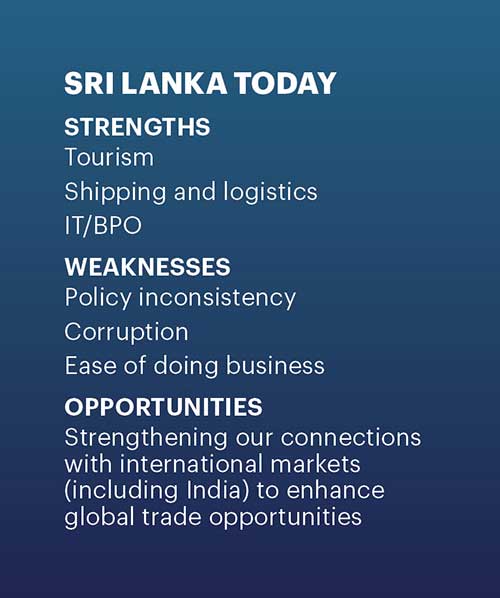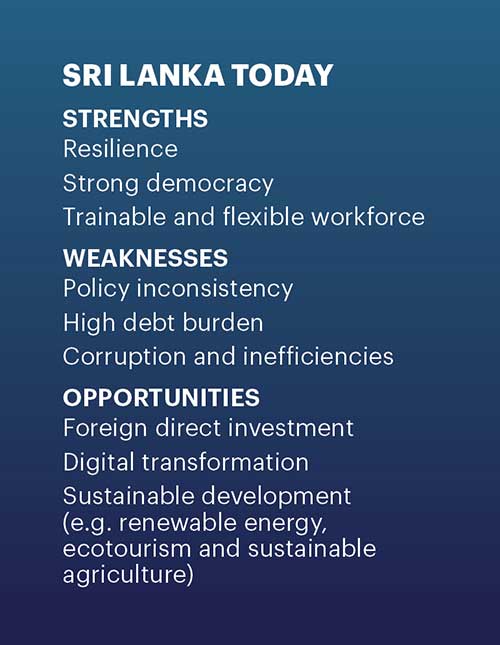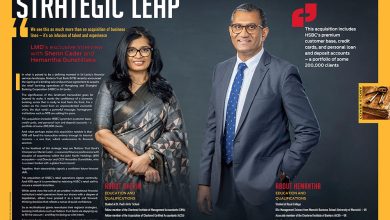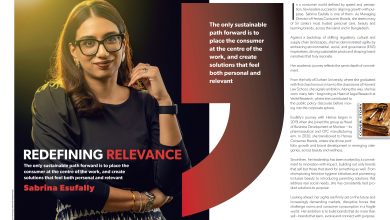
The Road Ahead
“The future holds both challenges and opportunities, particularly in terms of economic recovery and growth”

As Sri Lanka navigates a pivotal moment in its political and economic landscape, the insights of business leaders are more crucial than ever. The future holds both challenges and opportunities, particularly in terms of economic recovery and growth.
In this context, the interplay between governance, fiscal responsibility and private sector collaboration has become increasingly vital to shaping the nation’s trajectory.
Against this backdrop, the managing partners of the ‘big three’ audit firms in Sri Lanka – in financial year 2022/23, they collectively audited as many as 94 of the annual reports of the nation’s 100 leading listed companies, according to the LMD 100 – share their views on the state of the nation and business, the implications of impending policy changes and their vision for sustainable growth.
Their foresight and expertise not only illuminate the complexities of the prevailing macroeconomic environment but also provide a road map for navigating what in many respects is an uncertain future.
In this month’s cover story, we delve into the insights emanating from exclusive interviews with Duminda Hulangamuwa, Priyanka Jayatilake and Channa Manoharan – and explore the critical issues at play in the country today.
EY Sri Lanka – a prominent member of the global EY network – excels in providing assurance, tax, transaction and advisory services. The firm is dedicated to assisting clients navigate complex regulatory environments, enhance operational efficiency and drive growth. EY Sri Lanka has been ranked among LMD’s Most Respected entities.
At the helm is Hulangamuwa, the Country Managing Partner for EY Sri Lanka and the Maldives. With extensive experience in auditing and consulting, he plays a crucial role in guiding the firm’s strategic direction. His collaborative and client centric approach enables organisations to adapt to rapidly changing market dynamics.
KPMG Sri Lanka is among the island’s oldest firms with over 126 years of operations. It initially served trading and plantation companies during colonial times before becoming a part of the firm’s global network. Today, KPMG offers around 60 services across various sectors and has been ranked among LMD’s Most Respected entities.
As its Managing Partner, Jayatilake brings 33 years’ experience in technology, audit and advisory services. His leadership has been instrumental in establishing key functional divisions within the firm – including technology solutions, IT audit and advisory, outsourcing, HR solutions and executive search, contributing to KPMG’s growth in the region.
Deloitte Sri Lanka is a member of the world’s largest professional services firm Deloitte, which employs over 450,000 professionals in more than 150 countries. The firm offers a comprehensive range of services including audit and assurance, tax and legal, strategy, risk and transactions, and technology and transformation. In LMD’s 2024 Brands Annual, Deloitte was ranked among the leading corporate brands by the magazine’s readership.
As its Country Managing Partner of Deloitte Sri Lanka and Maldives, Manoharan counts over three decades in management consulting and advisory services. He has spearheaded large-scale transformation initiatives in business and finance while facilitating growth strategies for clients expanding into emerging markets.
– Compiled by Tamara Rebeira
GOVERNANCE CHALLENGES
Duminda Hulangamuwa advocates collaboration to facilitate sustainable economic growth
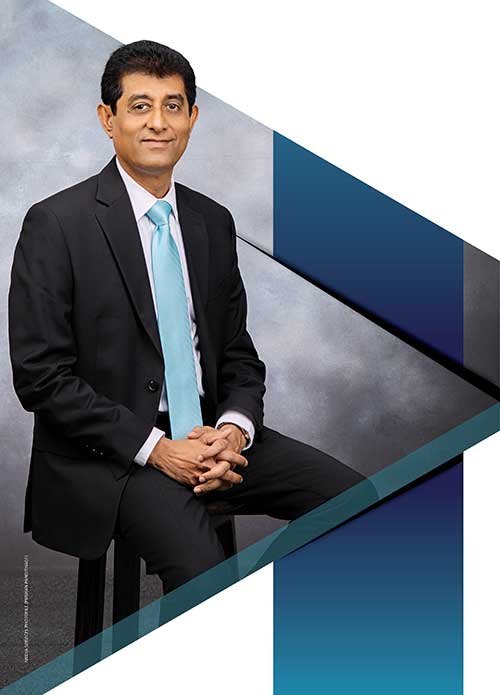
Q: What is your outlook for public-private partnerships (PPPs) in Sri Lanka over the next five to 10 years – and how do you anticipate the PPP landscape evolving?
A: Government policy regarding PPPs and role of the state versus private sector in the economy remains to be determined.
Based on what I’ve seen, heard and participated in however, it appears that the government will likely step back from direct involvement in business. Instead, entrepreneurship and business operations will largely be left to the private sector. State involvement will be limited to areas deemed to be of strategic economic importance.
So what defines ‘strategic’ from both an economic and public interest perspective?
It’s likely that sectors considered economically critical or of high public interest will remain under government control. However, the government may still encourage private sector participation in these sectors without completely relinquishing its influence or ownership.
This approach isn’t necessarily a bad thing – successful models in Europe or Singapore’s Temasek point to a government led function that’s similar to corporate entities. What matters more than ownership is how these enterprises are managed.
With competent and efficient management – similar to the private sector – strategic assets can be overseen by the government. Sectors such as financial services, infrastructure, electricity, power generation, fuel and ports are key areas where I believe the government will maintain control.
I also believe that the new government will understand the importance of the private sector and likely adopt a PPP model rather than a full privatisation approach. In this model, the government would retain a stake and have some influence, while the private sector brings in efficiency and capital.
It’s important to remember that Sri Lanka is currently facing financial constraints. Therefore, the most practical way to attract investment in infrastructure is through PPP projects where the private sector, either local or foreign, provides the necessary capital.
Meanwhile, the government can maintain a stake to ensure that public interests are protected, monopolies are avoided and price stability is maintained.
I believe that the government will lean towards PPPs rather than outright sales, presenting an opportunity for these partnerships to gain momentum moving forward.

“Complete divestment of SOEs could apply to non-strategic assets such as hotels and tourism where government involvement isn’t necessary”
Q: Given the ongoing debate about the privatisation of state institutions, how can they enhance their financial reporting to drive meaningful change and improve transparency?
A: There are two key issues. When discussing state-owned enterprises (SOEs), I prefer the term ‘reform’ over privatisation.
Reform can include improving efficiency, accountability and reporting, as well as encouraging private investment, whether the government retains a stake or fully divests.
The new government’s approach to SOE reform remains uncertain. It may focus on enhancing efficiency by granting these entities autonomy, free from political interference, similar to the Temasek model. However, the urgency and scope of such changes are unclear.
Complete divestment of SOEs could apply to non-strategic assets such as hotels and tourism where government involvement isn’t necessary. However, accountability and transparency should be prioritised across all sectors.
I’ve advocated for private sector investment in government institutions to drive transparency. Private investors demand accountability and international standard reporting, which improves overall performance.
Reporting won’t improve overnight without demand. Accountability drives better reporting, which in turn improves efficiency. Regardless of privatisation, all government institutions must implement reporting systems to ensure transparency and accountability.
“While Sri Lanka’s tax system is relatively simple compared to other countries, the bureaucracy surrounding it is cumbersome”

Q: What is your take on the future of the ease of doing business in Sri Lanka? And what specific areas require attention to improve the business environment and foster greater economic growth?
A: Sri Lanka was the first in the region to open its economy to foreign direct investments (FDI) in 1977. Despite this early start however, we have fallen behind countries in ASEAN and South Asia that opened later but surged ahead.
A key issue is that Sri Lanka remains overregulated, complicating business operations.
The excessive number of licences, approvals and agencies involved in project approvals poses significant challenges. For example, setting up a hotel requires approvals from multiple bodies while more complex ventures such as renewable energy face even greater regulatory hurdles. This bureaucracy leads to delays that deter investors.
Sri Lanka Customs operates under a century old ordinance and mandates an overwhelming number of documents for clearing goods. Exporters often submit nearly 20 documents, hampering efficiency and discouraging investment.
To attract more FDI especially in manufacturing – where we rely on importing raw materials to export finished products – simplifying these processes is crucial. The current system adds unnecessary costs and delays, making efficient operations difficult. Reforming regulatory and licencing regimes is essential for Sri Lanka to regain its competitive edge.
Taxation is often discussed while the real issue lies in its administration. While Sri Lanka’s tax system is relatively simple compared to other countries, the bureaucracy surrounding it is cumbersome, involving excessive paperwork, delays in processing refunds and repeated visits to the tax department.
Therefore, the challenge is not only legal but also administrative.
Changing the rigid bureaucratic mindset of public service is essential and adopting a more flexible, modern approach, especially from youth, can greatly improve the ease of doing business.

Q: What is your view on the balance between direct and indirect taxes – and what steps should be taken to strike the right balance?
A: A greater share of government revenue should ideally come from direct rather than indirect taxes. However, the limited number of individuals who can pay direct taxes presents a challenge.
For instance, with a corporate tax rate of 30 percent and an individual tax rate of 36 percent, less than 50,000 individuals earn more than Rs. 300,000 monthly, which restricts the effectiveness of direct taxes and forces the government to rely more on indirect taxes where the base is broader.
Currently, around 400,000 individuals contribute to direct taxes compared to an indirect tax base of about 22 million. Although indirect taxes have a wider reach, they burden everyone equally – the poor pay less overall due to limited consumption while the wealthy, who consume more, pay more in indirect taxes.
Ideally, the revenue mix should be 60 percent from direct taxes and 40 percent from indirect taxes, yet the current ratio is reversed with 80 percent coming from indirect taxes and only 20 percent from direct taxes.
The government must aim to redress this balance but achieving a 60:40 ratio will be challenging without improvements in living standards and income levels.
ACCOUNTABILITY PIVOTS
Priyanka Jayatilake hopes that wrongdoers will be brought to book sans political interference
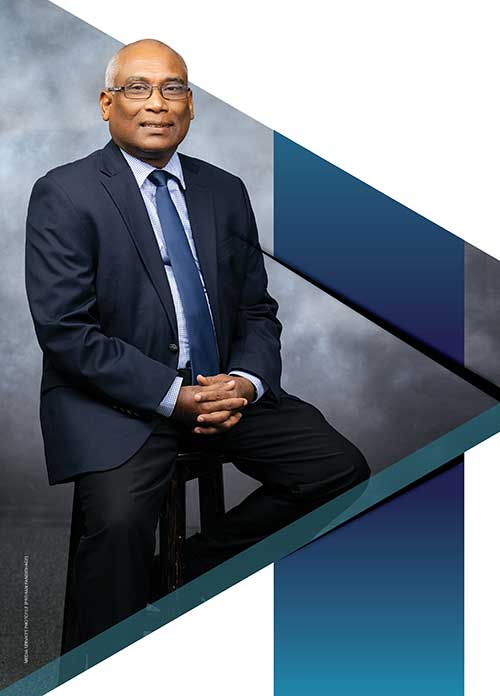
Q: How do you see the economic climate unfolding in the aftermath of the presidential election? And what impact is the election outcome likely to have on the business environment?
A: Although the presidential election concluded in a peaceful manner with parliament being dissolved, uncertainty will continue until the general election is held this month.
We are hopeful that the change in political culture will have a positive impact on the business environment and economic climate.
If the National People’s Power (NPP) succeeds in garnering a parliamentary majority and forms a stable government by appointing qualified individuals with unblemished reputations to key positions, it would be possible for Sri Lanka to gain the momentum needed to achieve economic growth.
This will have a positive impact on the business environment and socioeconomic climate that we’ve all been waiting for.
The new government’s governance model, economic policies and appointments of key officials to state institutions are yet to be announced – and as such, they will have an impact on the business climate.
This could mark the most significant and crucial transformation that the general public is expecting. The temporary appointments announced thus far demonstrate a focussed effort to appoint suitable candidates, which is a refreshing experience for us all.
There is hope and expectation that the new government will take serious action to minimise fraud and corruption, by strengthening laws and empowering the Attorney General’s Department along with other law enforcement agencies and regulators to act against wrongdoers without any political interference.
This would build a transparent and robust governance structure in the country – in turn increasing public confidence through key components such as good governance and values; transparency in areas involving procurement, government expenditure, the judiciary and others; meritocracy; and integrity.
“We are in the final stages of the debt restructuring programme, and must continue our agreed path with the IMF to restore credibility to the country’s credit ratings”

Q: Considering the prevailing economic environment and the IMF programme that Sri Lanka has agreed to adhere to, what strategies can the government and business implement to navigate the possible challenges ahead?
A: We are in the final stages of the debt restructuring programme, and must continue our agreed path with the IMF to restore credibility to the country’s credit ratings and accelerate the momentum towards an economic recovery.
However, it may be necessary to amend certain conditions within the International Monetary Fund framework to better align with our requirements to facilitate an economic revival and social justice.
To do so, the new government would need to take into serious consideration the cost of living, healthcare, education, agriculture, tourism, and the transformation of state-owned enterprises (SOEs) into efficient, transparent and performance driven entities.
Additionally, the digital transformation, ease of doing business through simplification of processes, cost optimisation, expanding the tax net and minimising revenue leakages should be prioritised with clear milestones.
“Accountability must be prioritised by creating clear frameworks that ensure government officials and institutions are held responsible for their actions”

Q: What impact do you anticipate the National Audit Office (NAO) having on public sector performance and governance in Sri Lanka under the new administration – and how can it support the implementation of effective public sector policies?
A: To strengthen the governance structure within the NAO, a comprehensive approach is needed with a focus on several key areas.
First and foremost, accountability must be prioritised by creating clear frameworks that ensure government officials and institutions are held responsible for their actions, particularly in relation to public spending and policy implementation.
In addition, capacity building is essential. The NAO must be equipped with the necessary technical training, funding and resources to carry out its mandate effectively.
This includes offering continuous professional development for auditors and staff to keep pace with evolving international auditing standards, financial systems, forensic auditing and best practices in governance.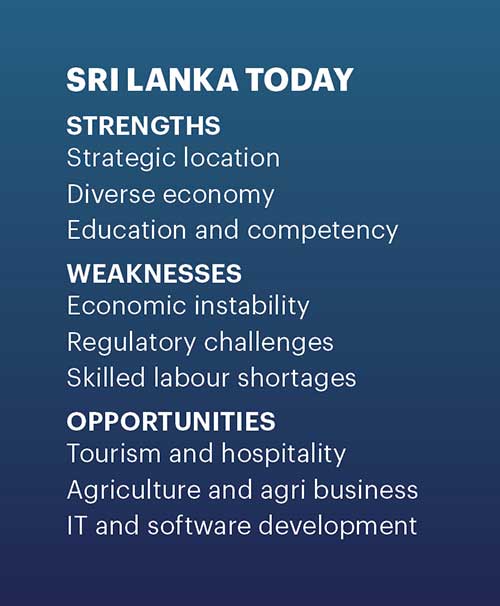
Furthermore, adequate legislation is required to expand the powers of the Auditor General (AG). Strengthening these powers would enable the AG to take decisive action against government officials involved in policy violations, fraud, corruption and noncompliance.
This should include legal provisions for punitive measures and mechanisms to hold individuals accountable for misconduct or mismanagement.
Finally, to ensure the effectiveness of these measures, the NAO’s independence must be safeguarded, ensuring that its actions are free from political influence or interference. This would not only enhance the office’s credibility but also boost public confidence in the integrity of government operations.
Q: Sri Lanka has yet to make any meaningful progress in the ease of doing business rankings. Your expectations of the new regime in this context are…?
A: It would be beneficial for Sri Lanka if the new regime pursues a revival in terms of policies, procedures, processes and operations.
Including digital transformation together with process re-engineering is extremely important to increase efficiency, reduce costs, and improve accuracy and transparency.
Some areas that could be focussed on to improve our ease of doing business rankings include process optimisation, and the introduction of single windows to facilitate transparency and efficiency.
Additionally, a digital citizen identity is essential, which would require extensive business process re-engineering. This digital citizen ID should cover the complete life cycle of an individual from birth to death, integrating processes from the issuance of a birth certificate to a death certificate.
It should be made mandatory for all citizen centric transactions to integrate key functions related to citizens and their status, performed by institutions such as the Registrar General’s Department, Department for Registration of Persons, Department of Immigration and Emigration (for passport issuance and validation), Election Commission of Sri Lanka, Department of Census and Statistics, and so on.
REFORM MANIFESTATIONS
Channa Manoharan expects economic reforms to continue while focussing on justice and social equity

Q: How do you envision the future of audit and advisory evolving here in Sri Lanka? And what role can audit firms play in such an evolution?
A: The audit and advisory landscape is evolving, shifting from traditional services to a multidisciplinary professional services model.
Firms are expanding their offerings to management consulting, digital transformation, risk advisory and transaction support, addressing complex business and government needs, with a focus on adding value and fostering sustainable growth.
In Sri Lanka, the future of audit and advisory services will be shaped by several mega trends that demand a proactive response.
Digital transformation is crucial – firms must adopt advanced technologies such as AI and guide clients on their own digital journeys, enhancing decision making through data driven insights.
The increasing emphasis on environmental, social and governance (ESG) practices places expectations on firms to help clients in implementing sustainability strategies, and improving transparency in ESG reporting while promoting diversity, equity and inclusion (DEI).
Indeed, the complex regulatory landscape requires firms to assist clients in navigating changing regulations and ensuring compliance, offering tailored risk management and governance solutions.
Another critical aspect is auditor independence, highlighted by the International Ethics Standards Board for Accountants (IESBA) guidelines and recent Banking Act by the Central Bank of Sri Lanka, which mandates auditor rotation for banks to enhance transparency and maintain objectivity.
Educating regulators, board audit committees and governance stakeholders in regard to the non-audit services that auditors can provide without compromising independence is essential. To meet rising expectations and maintain quality, the audit profession must evolve from a traditional trainee model to a graduate profession.
Key stakeholders – including regulators, the Institute of Chartered Accountants of Sri Lanka (CA Sri Lanka), and the Sri Lanka Accounting and Auditing Standards Monitoring Board (SLAASMB) – need to bring about this change.
“The pandemic and the economic crisis have pushed over 25 percent of Sri Lankans into poverty, exposing the fragility of the social safety net”

Q: Do you believe that a new political climate will influence strategic plans and priorities – be they fiscal, economic or social – in Sri Lanka?
A: Sri Lanka is no stranger to the impact political climates can have on its strategic direction. History shows that political decisions shape economic and fiscal outcomes, as well as the country’s social fabric.
The recent presidential election marked a pivotal moment with a new president tasked with a mandate to continue economic reforms while focussing on justice and social reforms.
Fiscal recovery will remain a priority for the new government. It will be crucial to build on recent positive developments such as the reduction of central government debt to 99.8 percent of GDP by June and securing an agreement with external commercial creditors to restructure US$ 17.5 billion with a 40.3 percent net present value (NPV) concession.
This restructuring will reduce interest payments, creating fiscal space for critical future investments. Continued collaboration with the IMF will be a priority to ensure sustained economic growth.
The president’s manifesto prioritises good governance with a focus on eradicating corruption. This is expected to improve credibility and investor confidence. Furthermore, there is an emphasis on key sectors such as renewable energy, technology, agriculture, fisheries, manufacturing and tourism in shaping the economic trajectory.
It is important to expedite the implementation of legislation related to the Economic Transformation, Public Debt Management, Public Financial Management and Sri Lanka Electricity Acts to maintain the reform momentum.
Equally important are the government’s efforts to address social inequality. The pandemic and the economic crisis have pushed over 25 percent of Sri Lankans into poverty, exposing the fragility of the social safety net.
“Infrastructure development – particularly in ports, telecommunications and energy – is critical to leverage Sri Lanka’s strategic location”

Q: What key areas do you believe the new administration needs to focus on to attract investment – including foreign direct investment (FDI) – in the medium term?
A: To attract investment, particularly FDIs, Sri Lanka must focus on critical areas for long-term economic recovery and growth.
The restructuring of external debt signals a decisive shift in fiscal management, restoring investor confidence and providing relief on interest payments, positioning the country as an attractive investment destination.
Macroeconomic stability is crucial as investors seek environments where indicators such as inflation, the debt to GDP ratio and currency stability are well managed. Regulatory reforms and improving the ease of doing business are equally important.
A streamlined framework that minimises bureaucracy and fosters transparency is essential for attracting FDI.
Infrastructure development – particularly in ports, telecommunications and energy – is critical to leverage Sri Lanka’s strategic location. Given the limited fiscal space, the government can use public-private partnerships (PPPs) to drive infrastructure investment, supported by a robust legislative framework and competent PPP agency.
Finally, sector specific strategies such as establishing special economic zones (SEZs), and offering targeted tax incentives can stimulate high value investments in key industries including IT, renewable energy and manufacturing.
The groundwork has been laid and the potential is immense but execution is of utmost importance.
Q: And what impact do you expect the outcome of the presidential election to have on IT and digital transformation initiatives in Sri Lanka?
A: The main contenders in the 2024 presidential election identified IT and digital transformation as key focus areas in their manifestos, acknowledging the digital economy’s vital role in Sri Lanka’s future.
At a time when structural reforms are needed to enhance governance, competitiveness and public services, these initiatives outline a road map to address inefficiencies and foster growth.
A major step forward will be the unique digital identification (UDI) system, centralising citizen data and streamlining access to public services, forming the backbone of digital public infrastructure (DPI) for transparent and accountable governance.
Tools such as e-procurement and digital invoicing for VAT collection will improve public administration, enhance financial oversight and increase tax revenue while preventing leakages.
Digitalising public services is a priority for the new government, targeting areas like digitising healthcare information, a digital platform for social protection and welfare, and a unified digital government services platform.

To enhance industry competitiveness and economic modernisation, the adoption of Industry 4.0 and 5.0 technologies will be promoted, supported by investments in digital infrastructure including high-speed internet, AI, IoT and cloud computing.
Workforce development and improving digital literacy need to be prioritised, as evident in the promises of free connectivity for educational institutions. Supporting youth in software and mobile app development will foster a startup ecosystem, which will foster innovation and a tech driven economy.
In an era of increasing reliance on digital platforms, cybersecurity and data privacy are crucial.
Sri Lanka has taken strides by launching the Personal Data Protection Act, and implementing the Central Bank’s cyber risk and resilience framework for the financial services industry, which needs to be strengthened further.

